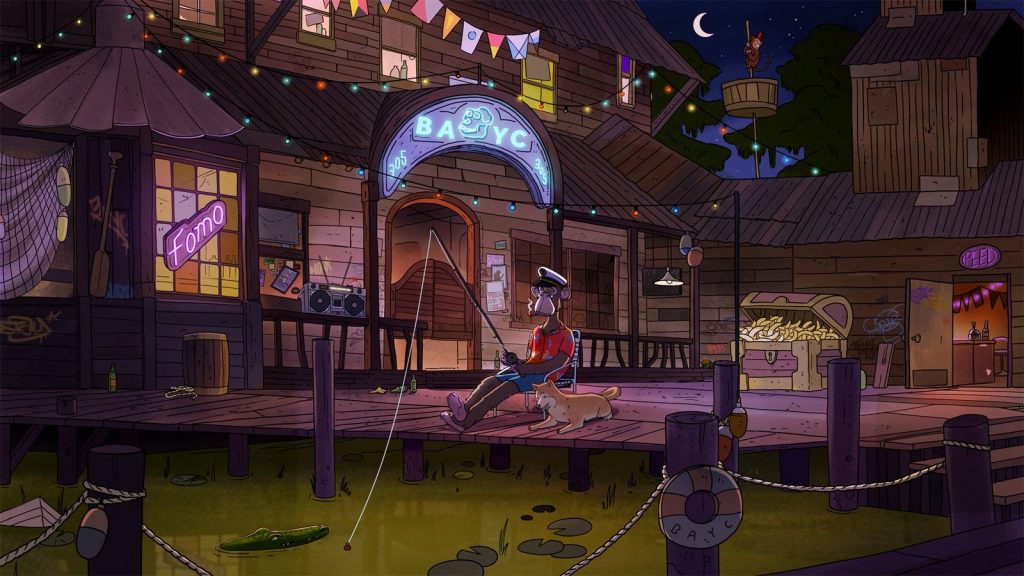Headline: What is the Bored Ape Yacht Club, and what does it tell us about NFTs?
Date:
Body: If one is good, then, ape is GREAT!! Today, we are speaking about monkey business, a REAL monkey business. Welcome to the Bored Ape Yacht Club. Why am I speaking to you about this? Am I simply aping what is a very popular current art form? No, these guys are also an example of an N.F.T. club. And, if you think the monkey puns are going to quit, wait for details!! I’ll be swinging for each one!
What is the Bored Ape Yacht Club
It is a website where you can purchase an NFT of an ape, festooned in various styles of dress, doing various things. They can then be used as your online avatar, and by purchasing, you get access to an online club of sorts. This club is part art appreciation society, part social club. (I have to admit, they are pretty cute. Don’t trust me, judge for yourself.)

Laugh all you wish, the creator of the BAYC started out with 10,000 images, and the day after launch, they had all sold. One expert in the crypto field, Matt Galligan said, “It became a status symbol of sorts, kind of like wearing a fancy watch or rare sneakers.” And, this is backed up with numbers; trade within these NFTs has netted people almost $100 Million. Many see this activity in very positive terms. “When everyone’s got skin in the game, it creates a new dynamic, as opposed to everyone being able to say what they want and critique everything without consequence,” Drew Austin, a technology investor who owns three Bored Apes. As you use the ape NFT, it becomes your identity, so, your anonymity is somewhat mitigated. Interestingly, the founders also choose to keep their anonymity and go by the pseudonyms of Gargamel and Goner. Each member of their staff has their own handle. Of course, regardless of their attempts, a BuzzFeed article outed the real names of the 2 creators.
Seeing the popularity of their creation, the Yuga Labs and 2 creators of BAYC have also started the Mutant Ape Yacht Club, using the same systems. Recently, Yuga Labs airdropped a “serum” to owners of Bored Apes. If they have their image “take” this serum, they will now have a mutated Ape. Depending upon the rarity of the mutation, these apes fetch prices that are truly bananas.
Why apes?
According to the founders, when one buys a lot of cryptocurrency, it is called “aping in” (I can only guess that this is a snide reference to getting into cryptocurrency because you didn’t want to miss out.)
Is this the only NFT club?
No, there are others. Pre-dating BAYC were groups like CryptoPunks and Hashmasks. All are alike as they make donations to related charities, have social events and other goodies. (In BAYC, each member gets a dog picture too, from the Bored Ape Kennel Club and a donation to an ape preservation charity is made in their name.) But, BAYC is a little different from these other clubs, in that the buyer gets the individual commercial right to reproduce that image on merchandise and to use it as they see fit. Just recently there was an ICO for “Ape coin” and these were air-dropped to all who had purchased an NFT. Far from a joke, this currency had a $3.7 Billion market cap on a recent close. Far from a sham, I believe that this scheme was hatched because Yuga Labs wanted to have advice from a variety of experts who could help them. Reading a list of people who received a lot of Ape Coin, it seems that they will receive a lot of advice from experienced entrepreneurs and executives.
How does it work?
When one “buys” an ape, one gets a standard ape with a random collection of attributes (controlled by algorithm.) But, certain attributes like laser eyes are programmed to be less common, and these avatars often sell for much higher prices. And, yes, some people buy hundreds at a time and sell them off, hoping to make a profit; It is a thing. Amazingly, there is already a well-publicized number of people with “seller’s regret.” One lady sold a figure for $1,500 just after the launch, and several months later will was seeing offers of at least $12,000 for the same NFT.
What keeps people from copying the image?
It’s pretty easy to block and copy and paste any image on the Internet. To be honest, there’s not much more than a stamp on a blockchain, but per several sources, the Twitter community and other social media communities are pretty serious about self-policing. Yet, one serial entrepreneur in the space said, “It’s taking a gamble on the idea that, in aggregate and over time, the fans might know what’s best for the universe that they care about.” Apparently, they are very willing to take a swing at this, as they purchased 2 of their largest competitors just 2 months ago. Having said this, barely a month ago, the private Discord server for BAYC participants was hacked. We shall see.

There is an interesting thing going on here.
The war between riches and “being cool” is not a new one. In the music scene, very often new artists are seen as “cool” when they have a small cult following and only occasionally make a big splash or 2. When they try to monetize (you know, to pay for fripperies, like food and rent) they are often seen as sell-outs. Visual artists seem to have the same challenge. In the research I have done for this post, this dichotomy is in full effect in this NFT area.
The Verdict
Regarding NFTs, we are at the very beginning of what promises to be a long and twisty road. The main questions seem to revolve around the issue of “how can I ensure that my NFT will retain its value?” A good question. I think we (being a litigious nation) need to iron out the relationship between an entry on a blockchain and a copyright. Some say that a copyright vests, just as soon as an entry is made on a blockchain. Some say that copyright has nothing to do with the information on the blockchain. Doubtless, in the not-too-distant future, there will be a court case or cases that look at exactly this issue. For now, perhaps the best approach is to be cautious. If you see an NFT that you really like, and it appears to be affordable, by all means, go ahead and test the waters. Just don’t go too far underwater.
REFERENCES
https://www.newyorker.com/culture/infinite-scroll/why-bored-ape-avatars-are-taking-over-twitter
https://fortune.com/2022/03/18/what-is-bored-ape-yacht-club-nft-apecoin-explained/
https://www.coindesk.com/learn/whats-the-story-behind-bored-ape-yacht-club-creator-yuga-labs/
https://www.fastcompany.com/90735768/bored-ape-yacht-club-jimmy-mcnelis-king-nft-kingship-future
Editor’s Note: Please note that the information contained herein is meant only for general education: This should not be construed as Tax Advice. Personal attributes could make a material difference in the advice given, so, before taking action, please consult your tax advisor or CPA.